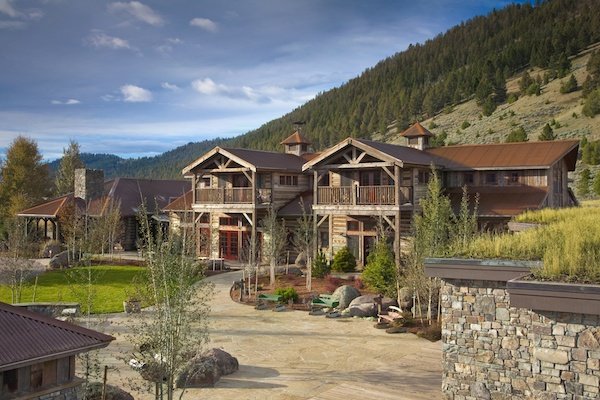8 Eco-Friendly Hotels & Resorts for Sustainable Travel in the USA
The environment has played an incredibly positive role in the industry, creating attractions people want to explore and enjoy, whether it’s the Grand Canyon, the Rocky Mountains, or Miami Beach.
However, negative impacts on the environment can negatively impact tourism.
Climate change and biodiversity loss are two interconnected issues that impact the hospitality industry.
Human-induced climate change results in extreme weather events that increase the cost of operations and reduce the number of tourists, while biodiversity loss can decrease a destination’s attraction.
Visiting renowned destinations and seeking out extraordinary sights often means checking into a hotel, but if fewer people have a reason to visit, it means fewer feet through hotel doors and guest rooms.
This post does contain some affiliate links which means The Honest Consumer may receive a commission if you decided to purchase. Our commission is at no additional expense to you! If you are able to book your travel through our affiliate links, this really helps support our work. Thank you!
As we can see, problems for the environment are problems for tourism. But it works the other way around too, in that the tourism sector impacts the environment. Establishments such as luxury hotels and resorts have large negative environmental impacts.
The industry needs a healthy environment to draw tourists – not to mention that travelers themselves are becoming increasingly eco-conscious.
If hotels and resorts want to continue checking in guests, they need to consider their own environmental impact as well and adapt accordingly.
This sustainable travel guide will explore what to look for in eco-friendly accommodations and introduce you to some of the best hotels and resorts taking sustainability seriously.
Environmental Impact of Hotels & Resorts
American hotels create almost 60 million tons of carbon emissions per year. Building a hotel or resort requires a large amount of energy and water, and a deep carbon footprint.
Once a hotel or resort is established, there are running and maintenance costs which also require energy and water.
And there’s the waste to consider, from construction waste during the building phase to the plastic bottles and bags, single-use toiletries, straws, and food waste from hotel restaurants and bars that have been par for the course in the daily running of hotels.
How and where the hotel is built can have an impact as well for the local community.
This includes not only the type of materials used but also the local people and animals who may be displaced when land is cleared; surface soil erosion caused by construction, and the disruption of natural water flows.
You can look for hotels who follow green practices, however!
What Eco-Friendly Initiatives Should Consumers Look for When Picking a Hotel or Resort?
The ideal situation is for hotels and resorts to be designed and built eco-consciously from the get-go. This is known as bioclimatic architecture. But that does not mean that long-established places have been sitting on their laurels, nor should they.
Hotels and resorts are implementing sustainable measures when making renovations, as well as in the general running of the hotel, whether it’s conserving energy and water or cutting down on waste and use of single-use plastics.
Here’s what you can look for when picking an eco-friendly, sustainable hotel or resort.
Energy Use
Renewable energy sources such as wind and solar.
LED lighting and Energy Star-compliant appliances.
Smart-energy sensors that allow areas to turn off heating or air conditioning when windows are open and to automate switching lights on and off as necessary.
Water Consumption
Rainwater harvesting and greywater recycling systems.
Tank fill diverters in toilets and low-flow showers.
A towel-and-sheet program that minimizes laundry loads.
Waste Reduction
Bulk toiletry options that can be refilled instead of supplying single-use options.
Composting and recycling.
The elimination of plastic water bottles.
Use of sustainable materials.
Food Sourcing
Support local farmers & growers by sourcing local foods
Organic ingredients
Seasonal menus that incorporate local grown foods
These are just a few sustainable design measures to look out for. But there is much more hotels and resorts can do such as working within their local communities, such as seeking local suppliers and selecting seasonal food for their restaurant kitchen.
A spot of gardening can help too: green roofs or a rooftop garden can stock the kitchen with organic food, reflect light, and slow rain runoff. Going the extra mile has even seen hotels and resorts fund environmental research and conservation in local areas.
8 Eco-Friendly Hotels & Resorts to Visit in the USA
Here are some of the best sustainable hotels in the U.S. that are equipped with green initiatives like LEED certification, environmental design, solar power, and more.
1 Hotel Brooklyn Bridge: A Sustainable Hotel in New York
With sweeping views of the East River and Manhattan skyline, the LEED Gold-certified 1 Hotel Brooklyn Bridge brings the outdoors inside with biophilic design elements.
Water consumption is limited by low-flow plumbing fixtures and a rooftop rainwater reclamation system used for irrigation. Waste is avoided or minimized through the use of reusable and recyclable items like cups and carafes made from recycled wine bottles.
Elements of the hotel were designed with regional, reclaimed materials such as lobby tables made from heart pine beams from the former Domino Sugar Factory in Brooklyn.
Food is sourced from farmers in New York, New Jersey, and Ohio; and the hotel’s restaurant, café, bar, cocktail lounge, and lobby farm stand work with fresh, seasonal, and sustainable ingredients.
On-site composting is practiced and there is even an organic garden.
The Allison: An Eco-friendly Resort & Spa in Oregon’s Wine Country
Based in Oregon, The Allison Inn & Spa has the LEED Gold certification. Energy-saving features include solar-powered hot water, photovoltaic cells generating 7% of their electricity, and the use of energy-efficient appliances and computers.
Programmable thermostats and motion sensors control heating and cooling in unoccupied rooms. Waste is cut down by not using any plastic bottles or Styrofoam cups, and making glassware and candle holders out of reclaimed wine bottles.
Rooms have refillable bottles of soap, shampoo, and conditioner. Water-saving measures include a sheet-and-towel-saver program.
When it comes to food, local suppliers are used as much as possible and the hotel also sources from its 1.5-acre chef’s garden and greenhouse. The Allison’s signature restaurant Jory boasts a menu featuring the native flavors of the Willamette Valley.
Hotel Terra Jackson Hole: An Eco-friendly Noble House Resort
With interiors that capture natural light and exteriors that minimize light pollution, Hotel Terra captures the beauty of the outdoors while trying to protect it. They are the first LEED Silver-certified hotel in Wyoming.
They use less energy thanks to windows that are layered with low-emissivity, a reflective coating that keeps heat inside during winter and outside during summer, reducing the need for energy-guzzling heating and cooling.
Temperature control is further managed by systems that power down unused rooms. Water conservation is achieved by the use of low-flow fixtures and dual-flush toilets.
There is a water refill station in the lobby and guests are provided with reusable aluminum bottles.
The environment was also kept in consideration when it came to building materials, with the hotel using roof shingles made from reinforced vinyl, cellulose fiber, and recycled tires, as well as 80% recycled content in the building structure’s steel.
Inn at Discovery Coast: Enjoy the Natural Beauty of the Pacific Northwest Coast
A stay at the Inn at Discovery Coast promises to be one of discovery – just as the name suggests – with bike rides, hikes, historic trails, and scavenger hunts, all while being surrounded by ocean views.
Located in Washington, this 12-room boutique hotel, the inn is part of Adrift Hospitality – a group of inns and hotels that includes Ashore Hotel.
As part of Adrift Hospitality, the inn is a member of the Center for Responsible Travel, a non-profit organization focused on how tourism can be responsibly planned, developed, and managed.
Inn by the Sea: The Sustainable Maine Resort
Surrounded by indigenous gardens, Inn by the Sea promises luxury inspired by nature. Located in Cape Elizabeth, Maine this LEED Silver-certified inn composts food waste, uses post-consumer paper products, and recycles.
Rooms are cleaned with non-toxic Green Seal products. The menu at their restaurant Sea Glass boasts Maine fare, including fresh, underutilized seafood from the Gulf of Maine.
If you want to keep up your gym routine, you can hit the cardio room, which makes use of recycled rubber floors, or take a dip in their outdoor pool heated with energy efficiency solar panels.
For relaxation, there’s the spa, featuring walls designed with recycled sheet rock and floors made from recycled cork.
Ashore Hotel: Relax by the Oregon Coast
From bike rides and a dip in the pool to snacking on s’mores next to a bonfire, Ashore Hotel is all about fun and respite. They’re also dog-friendly! Based in Seaside, Oregon, they’re just twenty minutes from both Astoria and Cannon Beach.
Eco-friendly measures include recycling bins in all rooms, and they only use biodegradable, non-toxic cleaners. Organic and local materials and suppliers are chosen wherever possible.
One of their partners includes Sleepy Monk coffee, which roasts organic coffee in small batches in nearby Cannon Beach.
The Palms Hotel & Spa in Miami: Eco-friendly Practices
A Green Globe Certified hotel, The Palms Hotel & Spa in Miami has ditched Styrofoam and single-use plastic items.
Instead they make use of aluminum water bottles, reusable acrylic glasses and metal cutlery at the pool, bioplastics and wood cutlery for the beach, and refillable, Bee Kind toiletries.
Bathrooms have low-flow showers, while there is LED lighting throughout the hotel. Sustainable measures are led by the Green Team and the hotel hosts beach clean-ups that involve guests and surrounding communities.
You can even grab a bucket to take along any time you hit the beach, so you can do your own clean-up. Recycling bins are also available throughout the hotel. Cleaning products are biodegradable and non-toxic to aquatic life.
The Ranch at Rock Creek: Sustainably Enjoying Nature
Committed to sustainability since it opened, The Ranch at Rock Creek in Philipsburg, Montana has implemented many eco-friendly measures.
They have eliminated single-use plastic; reduced emissions through biking and walking, with shuttles and on-site housing available for staff; and organized river clean-ups, highway clean-ups, and tree plantings.
Seventy-five percent of their dining is sourced from local farms, with most of their meat, summer produce, grains, and dairy coming from Western Montana. They have a bee program and use the honey for restaurant dishes and cocktails.
Walkways feature solar-powered lights, and LED lighting is used throughout the resort. They are closing the loop on their cattle program, raising their own beef to serve in their restaurant.
You can learn more about nature through their Master Naturalist Program, while the ranch has also contributed to the University of Montana’s bird ecology program.
Tips for an Eco-Friendly Stay
For sustainable tourism, you can make inquiries about the above-mentioned measures via phone, social media, or e-mail to help you pick the right hotel or resort. But there are also several things you can do as a guest to reduce your impact while traveling.
Bring your own toiletries
Refuse straws
Reuse towels
Unplug appliances to reduce energy consumption
Turn off lights, heating, and air conditioning when you don’t need them, especially when you leave the room
If your room does not need to be cleaned, put the do not disturb sign on your door
If you find potential for the hotel or resort to do more, provide feedback
Check for certifications such as LEED, Green Globe, Green Seal, or Edge
Hopefully this guide has helped you learn what sustainable practices to look for when searching for a place to stay!
For more ethical & sustainable tips be sure to explore more conscious lifestyle blog posts, follow The Honest Consumer on social media, subscribe to our newsletter, & check out the Ethical & Sustainable Brand Directory.






























